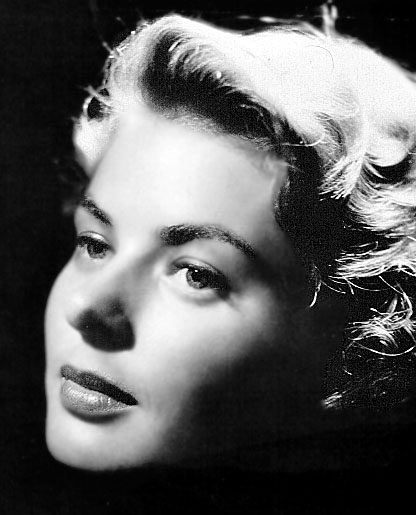
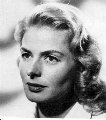 Ingrid's mother died when she was just three years old, leaving her father to
bring her up alone. He encouraged her play-acting and introduced her to the
theatre. Sadly, he died of cancer when Ingrid was only thirteen. Ingrid then
went to live with her Aunt Ellen who was elderly, unmarried and had a heart
condition, which was to kill her only six months later.
Ingrid's mother died when she was just three years old, leaving her father to
bring her up alone. He encouraged her play-acting and introduced her to the
theatre. Sadly, he died of cancer when Ingrid was only thirteen. Ingrid then
went to live with her Aunt Ellen who was elderly, unmarried and had a heart
condition, which was to kill her only six months later.
Ingrid then began a new life living with her Uncle Otto, Aunt Hulda and her five cousins. Her acting ambitions were in such stark contrast with her intense shyness that she received little encouragement from them. Her first real opportunity came from Greta, an old flame of her father. Greta managed to get Ingrid work as a film extra. Although the work only lasted fifteen minutes, Ingrid stayed at the studio all day, captivated by the movie-making process.

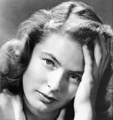 Soon after joining she was introduced to Petter Lindstrom, a young dentist.
When the term ended the next summer, Ingrid wanted to stay with Petter.
This meant finding a job. She managed to get an screentest at
Svenskfilmindustri. Gustav Molander, the director in charge of the
screentest, was impressed by Ingrid. He recognised her "star quality".
Soon after joining she was introduced to Petter Lindstrom, a young dentist.
When the term ended the next summer, Ingrid wanted to stay with Petter.
This meant finding a job. She managed to get an screentest at
Svenskfilmindustri. Gustav Molander, the director in charge of the
screentest, was impressed by Ingrid. He recognised her "star quality".
A week later Ingrid began work on Munkbrogreven (The Bridge of Monks), directed by Edvin Adolphson. At this stage she had every intention of returning to drama school in the autumn. However, the financial security offered by the film industry was too tempting. That August she tried to persuade the Royal Dramatic Theatre's director, Olof Molander (brother of Gustav) that she could work in films for a while, then return to school. He insisted that she stayed at the school. She left.
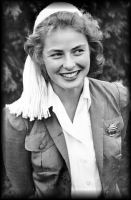
Her sixth film for Svenskfilmindustri was Intermezzo, in which she starred opposite Gosta Elkman. It was a love story. It was also the film that would catapult her to international stardom.
On July 10th, 1937, Ingrid Bergman and Petter Lindstrom were married. She was twenty one years old. They set up home together in a small apartment in Stockholm.
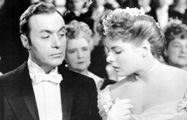 Shortly after the marriage, Berlin-based UFA Films offered Ingrid a
screentest. Ingrid had ambitions outside Swedish films and, as German was
her second language, she accepted. A three picture contract resulted from
the test, although only one was ever made, Die Vier Gesellen (The Four
Companions).
Shortly after the marriage, Berlin-based UFA Films offered Ingrid a
screentest. Ingrid had ambitions outside Swedish films and, as German was
her second language, she accepted. A three picture contract resulted from
the test, although only one was ever made, Die Vier Gesellen (The Four
Companions).
Ingrid had decided that she did not wish to complete the contract. UFA Films was Nazi-dominated and she did not want to be in Germany making a propaganda film. She was also pregnant at the time. Her Swedish agent started to look for other contracts for her. Ingrid subsequently had her baby and named her Friedel Pia.

On May 6th, 1939, Ingrid Bergman arrived in New York. Petter stayed in Sweden to look after Pia. After two weeks in New York, she went to Los Angeles to stay with the Selznicks (David and Irene) for three months. When she met David Selznick, he wanted to mould her into a Hollywood star, starting with changing her name. Ingrid Berjman, Ingrid Berriman and Ingrid Lindstrom were all considered. Ingrid Bergman, however, was having none of it. She was Ingrid Bergman and that was it. As far as she was concerned, Selznick had brought her to America as seen, and she wasn't going to change a bit.
Faced with Ingrid's uncompromising attitute, Selznick hit on the idea of selling Ingrid as a completely natural star. No name-change, no make up, nothing. This was exactly how her first Hollywood screentest was done.
 Her first Hollywood first was a remake of Intermezzo, subtitled "A Love
Story" for the American market. Leslie Howard played the Gosta Elkman
role. After completing the film she returned to Sweden, not knowing
whether Selznick was going to take up the option for a second picture.
Her first Hollywood first was a remake of Intermezzo, subtitled "A Love
Story" for the American market. Leslie Howard played the Gosta Elkman
role. After completing the film she returned to Sweden, not knowing
whether Selznick was going to take up the option for a second picture.
She had been away from her family for more than three months, but soon after arriving in Sweden she began work on Juninatten (A Night in June) for Svenskfilmindustri. The war was in full flight at this point, and Selznick requested that she returned to America as soon as possible. She did so with Pia, leaving Petter in Sweden.
While in New York waiting for a film to come up, she starred in a play called Liliom. The critics and the public were unanimous in their praise of Ingrid.
Petter joined her in America shortly and they settled into married life. Her next film was Adam Had Four Sons, followed closely by Rage In Heaven. Over the next eight years she appeared in numerous films including Casablanca in 1942 and Gaslight in 1944, for which she won her first Academy Award. She was now one of Hollywood's biggest stars. This was all about to change.

She wrote to Rossellini and offered her services as an actress in one of his films. He eventually agreed and Ingrid and Petter met him in Paris. After preliminary discussions, no contract had been signed, so in January 1949 Rossellini visited Ingrid and Petter in California.
The film they were to make was called Stromboli. However, financing it was problematic. Samuel Goldwyn had offered at first, but later reneged. The problem was solved by Howard Hughes. He had previously telephoned Ingrid to inform her that he had just bought RKO studios for her. This came to nothing but she later contacted him. He agreed to finance the picture without hesitation.
Ingrid's marriage to Petter was already under some strain, and the forthcoming events did nothing to help this. In March 1949, Ingrid left America for Rome. She was not to return for seven years.
Rossellini's film-making style amazed Ingrid. There was no script, and the leading actors were picked from the street by Rossellini.
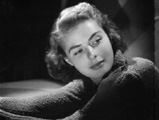 Shooting on Stromboli began on April 4th. By this time Ingrid had already
written to Petter informing him that their marriage was over. Meanwhile, the
press was rife with speculation about Ingrid and Roberto. On April 22nd,
Ingrid received a letter from the Motion Picture Association of America,
requesting that she deny all rumours as soon as possible, otherwise her
career would almost certainly be over. She ignored their request.
Shooting on Stromboli began on April 4th. By this time Ingrid had already
written to Petter informing him that their marriage was over. Meanwhile, the
press was rife with speculation about Ingrid and Roberto. On April 22nd,
Ingrid received a letter from the Motion Picture Association of America,
requesting that she deny all rumours as soon as possible, otherwise her
career would almost certainly be over. She ignored their request.
Stromboli was not completed until August 2nd. Meanwhile, there had been discussions with Petter about divorce, threats from RKO to cut off funding, and intensified speculation about Ingrid's private life. She had also issued a press release to the effect that she was leaving the movie industry with the completion of Stromboli. To compound matters, Ingrid was pregnant. This event was soon headline news all across America. In February of 1950, Ingrid Bergman gave birth to a son, Robertino.
On March 14th, Ingrid was denounced in the American Senate by Senator Edwin Johnson, who stated that she should never again be allowed to set foot on American soil.
Over the next five years, Ingrid made four more films with Rossellini, all commercial failures. In 1952 she gave birth to twin daughters, Ingrid and Isabella.
In 1956, Ingrid separated from Rossellini. She was offered a part in a 20th Century Fox film, Anastasia, to be filmed in the U.K. The film was released while Ingrid was starring in a play called "Tea and Sympathy" in Paris. The critics were full of praise for Ingrid's performance in the film, for which she was awarded the New York Critic's Award and her second Academy Award.
 Meanwhile, she made Indiscreet, a light romantic comedy, with Cary Grant
in London. Ingrid's next film was to be The Inn of the Sixth Happiness. Her
performance in the film was again highly praised. Towards the end of 1958,
she and Lars were married. With Anastasia, Indiscreet and The Inn of the
Sixth Happiness, Ingrid was again a big star.
Meanwhile, she made Indiscreet, a light romantic comedy, with Cary Grant
in London. Ingrid's next film was to be The Inn of the Sixth Happiness. Her
performance in the film was again highly praised. Towards the end of 1958,
she and Lars were married. With Anastasia, Indiscreet and The Inn of the
Sixth Happiness, Ingrid was again a big star.
Ingrid and Lars worked together on a TV adaptation of The Turn of the Screw for NBC. Over the next few years she appeared in several TV productions, movies and plays, including a production of Hedda Gabler.
In 1973 Ingrid discovered that she had breast cancer. She had a mastectomy soon afterwards and carried on working as normal. Very few people knew of the operation.
1974 saw Ingrid starring in Murder on the Orient Express for which she won her third and final Academy Award, something which is surprising considering the small part that she played.
In A Matter of Time in 1976, Ingrid starred with her daughter Isabella Rossellini, herself now a promising young actress. Her final feature film was Autumn Sonata, directed by Ingmar Bergman. She received an Academy Award nomination for her part in the film. Her cancer returned during the making of the film.
On August 29th 1982, after a small birthday celebration, with Lars Schmidt at her side (although they were then divorced), Ingrid Bergman died.
 Return To Intimate Portraits
Return To Intimate Portraits Return To Index
Return To Index